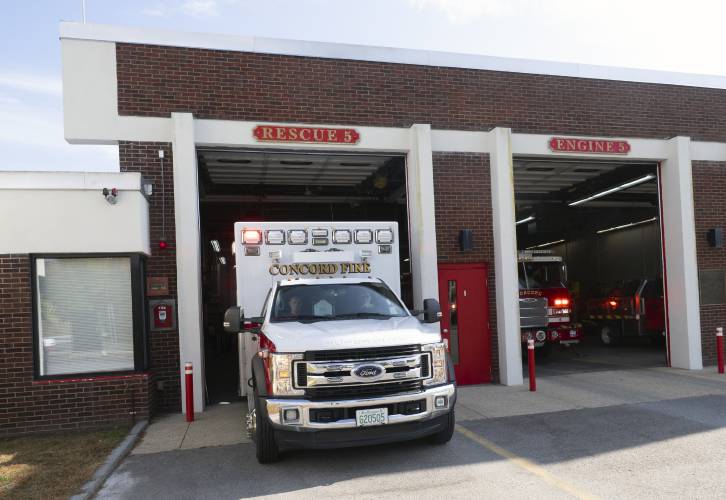State launches tuition reimbursement program to recruit and retain first responders

The Rescue 5 ambulance is now attached to Engine 5 at the Manor Station where it is closer to the parts of Ward one, two and parts of three ant ten where it is needed more. GEOFF FORESTER
|
Published: 12-18-2023 2:41 PM
Modified: 12-18-2023 2:57 PM |
To retain and recruit more police officers, firefighters and EMTs, New Hampshire has launched a program offering tuition reimbursements at the state’s community colleges for those looking to enter the field.
The First Responder Tuition Reimbursement Program, an initiative launched in partnership with the New Hampshire Department of Safety, the Police Standards and Training Council and the Community College System of New Hampshire will support the career development of aspiring law enforcement officers, professional firefighters, and emergency medical technicians by paying one course per semester taken at any of New Hampshire’s community colleges.
“Investing in rigorous training for our fire, police, and EMS personnel is not just a commitment to safety but a pledge to elevate the quality of life in the Granite State,” said Justin Cutting, the director of the Department of Safety’s Division of Fire Standards and Training & Emergency Medical Services. “Through preparedness, these dedicated professionals safeguard our communities, fostering resilience and a sense of security that defines the essence of a thriving New Hampshire. Training today, supported by vital funding, shapes the safety and well-being of tomorrow.”
Recruitment has been a problem at police and fire departments across the state, especially at smaller departments that lose employees to higher-paying positions in larger communities. In order to broaden the pipeline of job seekers, the new program will cover tuition and required fees for one course per semester.
“We ask a great deal from our first responders in communities across the state, and they consistently rise to the challenge,” said Mark Rubinstein, chancellor of the Community College System of New Hampshire. He praised the program for helping to solve the recruitment issues facing police and fire departments around the state.
John Scippa, director of the State Police Standard and Training Council, said the job of a police officer is intense and comes with constant scrutiny. He said the allure of private-sector jobs can make public-service jobs less favorable.
“I think that there are a lot of private sector jobs that have better schedules, they pay more money and have greater benefits,” said Scippa. “There’s a lot of people who see all those as a kind of incentive to either not come into policing and corrections or to leave. So we really have to stress the importance of public service, serving communities and the state.”
Both police officers and firefighters hired today are eligible to retire and collect a pension at age 49 after 24 years of service, according to the New Hampshire Retirement System.
Article continues after...
Yesterday's Most Read Articles
 Neighboring landowner objection stalls Steeplegate redevelopment approval
Neighboring landowner objection stalls Steeplegate redevelopment approval
 How has Hopkinton, one of the smallest public schools in New Hampshire, become such a lacrosse powerhouse?
How has Hopkinton, one of the smallest public schools in New Hampshire, become such a lacrosse powerhouse?
 Northeast Coffee Festival comes to Concord this weekend
Northeast Coffee Festival comes to Concord this weekend
 Rock ’N Race draws 3,250 participants, still has further to go to meet fundraising goal
Rock ’N Race draws 3,250 participants, still has further to go to meet fundraising goal
 Steeplegate project to reopen to public comment as developer seeks to reduce required parking
Steeplegate project to reopen to public comment as developer seeks to reduce required parking
 High schools: Concord girls’ 4x100-meter relay sets school record at Merrimack Invite, plus more track, baseball, lax and tennis results
High schools: Concord girls’ 4x100-meter relay sets school record at Merrimack Invite, plus more track, baseball, lax and tennis results
The new initiative aims to boost recruitment among individuals who want to pursue a job as a first responder but lack the financial means for firefighter or EMT training expenses.
State Senator David Watters sponsored Senate Bill 153, which allocated funding for the program.


 Adam Montgomery sentenced to minimum 56 years on murder charges in young daughter’s death
Adam Montgomery sentenced to minimum 56 years on murder charges in young daughter’s death Following budget cut, Pembroke revisits future of elementary school re-build
Following budget cut, Pembroke revisits future of elementary school re-build Granite Geek: Free government software for taxes – what could go wrong? (Not much, as it turns out)
Granite Geek: Free government software for taxes – what could go wrong? (Not much, as it turns out)
